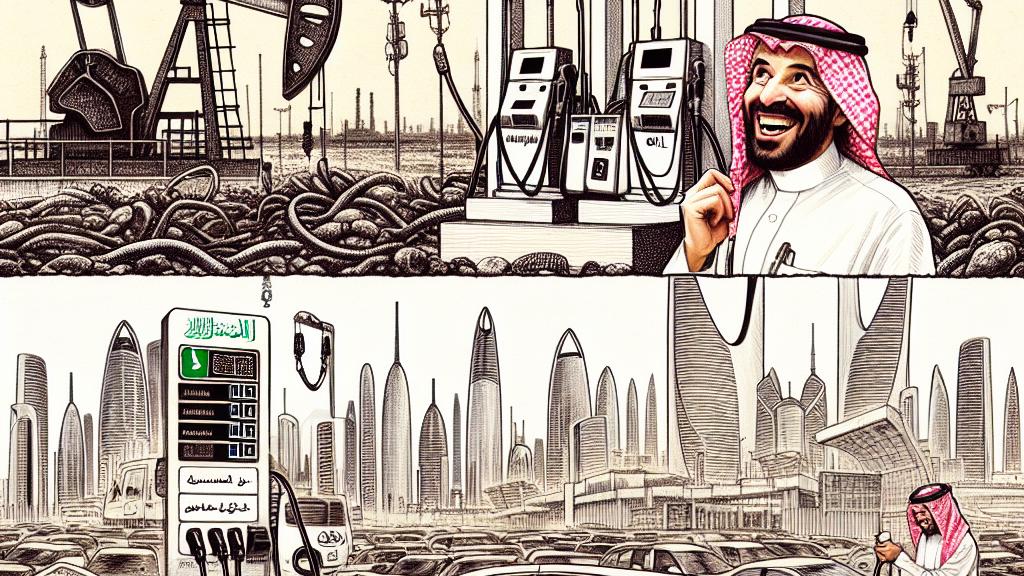The Electric Revolution: Saudi Arabia's Surprising Shift from Oil to EVs!
Overview
- The electric vehicle (EV) market in Saudi Arabia has surged, ballooning to nearly 800 units sold last year.
- Saudi Arabia plans to diversify its economy, targeting production and export of 150,000 EVs by 2026.
- While challenges like limited charging infrastructure and high vehicle costs exist, substantial initiatives are being launched to promote EV adoption.

The Unexpected Rise of Electric Vehicles in the Kingdom
In a dramatic turn of events, Saudi Arabia, known for its deep foundation in oil production, is witnessing an unexpected rise in electric vehicle (EV) interest and sales. The market for EVs has tripled in size over the last year, reaching almost 800 registrations, as fueled by factors such as rising fuel costs and a growing sensitivity to environmental issues. Government officials and local consumers alike are recognizing the importance of investing in sustainable transport. Individuals like Hamed al-Rafidain exemplify this shift. After spending approximately $530 a month on fuel for his traditional four-wheel drive, he has chosen an electric vehicle not just for its lower operating costs but also for its potential to contribute to reducing pollution in the densely populated capital of Riyadh. This consumer shift underscores a broader cultural change in a nation traditionally reliant on fossil fuels.
Vision 2030: Charting a New Economic Course
As part of the ambitious Vision 2030 initiative, Saudi Arabia aims to reduce its economic reliance on oil by fostering development in other key sectors, including electric vehicles. The Saudi government forecasts significant growth, targeting the production and export of over 150,000 EVs by 2026. The strategy includes substantial investments in partnerships with global brands such as Lucid Motors and Chinese manufacturer BYD, highlighting a commitment to building a robust domestic EV supply chain. The Public Investment Fund's control of a significant portion of Lucid not only illustrates this investment trend but also aims to position the Kingdom as a competitive player in the global luxury EV market. As the Kingdom seeks diversification and economic stability in an era of fluctuating oil prices, the embrace of electric mobility represents a pivotal evolution toward future sustainability and resilience.
Addressing Infrastructure Challenges and Future Opportunities
While the enthusiasm for electric vehicles is evident, Saudi Arabia faces notable obstacles that could impede widespread adoption. Chief among these challenges is the underdeveloped charging infrastructure; many potential EV owners worry about the feasibility of long trips due to the limited range of current vehicles, which averages around 400 kilometers. To counter this, the Saudi government has instituted plans to construct 5,000 new charging stations across the nation by 2030, which will greatly enhance accessibility and public confidence in electric vehicle use. Additionally, as global oil prices remain volatile, the push for EVs serves not only an environmental purpose but also acts as a hedge against economic instability. Hybrid vehicles remain popular among consumers seeking the best of both worlds, proving that the transition to fully electric options will be gradual. However, as infrastructure expands and consumer awareness grows, Saudi Arabia is poised to enter a new era where electric vehicles play a critical role in defining its transportation future.
The Road Ahead: Saudi Arabia's EV Future
Looking forward, Saudi Arabia's pivot to electric vehicles is not merely an immediate trend but a crucial component of its long-term vision for economic and environmental sustainability. The government's dedication to establishing EV infrastructure and partnerships with leading manufacturers reflects an intent to breed a vibrant industry that can thrive independently of oil. As more models become available and public charging options increase, EV adoption will likely accelerate, creating jobs and stimulating investment in emerging technologies. With the global market for electric vehicles growing rapidly, Saudi Arabia's strategic efforts could position it as a major player in the EV landscape, challenging perceptions and creating new opportunities that will benefit both the domestic economy and environmental goals. The Kingdom's journey into this new automotive realm signifies a profound transformation, illustrating how traditional energy powerhouses can adapt to a dynamic global economy focused on sustainability and innovation.

Loading...